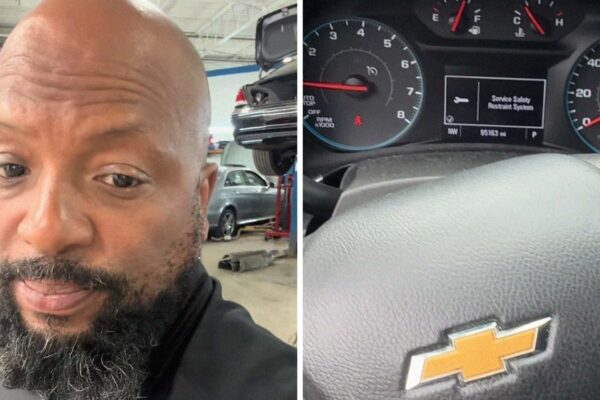It is impossible for the car to be perfect outside the box. Even some of the most brown vehicles offered for sale today are subject to calls. The term “summons” tends to carry a negative connotation, because it defines a mistake, for passenger cars, which means project safety.
But it should not.
Recently, there seem to be a lot of retrieval. Does this mean that cars have become less reliable? Or less safe? Or does this mean that manufacturers intensify their accountability, address the problems that they have not faced before?
Simple questions with complex answers.
Was there more recovery operations?
Photo by: nhtsa
The short answer yes. Last year, the National Road Traffic Safety Administration (NHTSA) issued a set of data on retrieval operations from 2003 to 2023, indicating a general escalating trend in both the number of retrieval operations and the number of vehicles that were called.
Last year was a little stranger. In 2024, car manufacturers released only 445 calls, including about 29 million cars – a decrease in each of the standards compared to 2023.
This year also goes down, at least in the number of vehicle calls. Auto -making companies summoned more than 10.7 million cars during the first half of 2025, according to BizycarService Management System that focuses on calling for agents.
The number of retrieval operations issued in 2025 increased during the first two, despite the issuance of 229 campaigns. This mostly thanks to Ford, which issued 88 of this reminder alone, or about 36 percent. Ford products are slightly more than 40 percent of all vehicles that were called in 2025 so far.
But why was there more reminder?
There is a set of reasons that make the number of retrieval operations and the amount of vehicles that have been called out over the past 22 years. While the number of new cars sold in the United States every year usually hovering between 14 and 17 million cars, the cars themselves have grown greatly in complexity.
Your regular passenger car is more complicated than it was 20 years ago. Because cars are more complicated, there is more potential for things to get worse. Active safety systems, adaptive suspension, brakes and guidance by wires, multi-screen information and entertainment systems, and hybrid-hybrid headquarters are just some reasons why your car has returned to the store shortly after leaving it.
Then there is the increasing complexity of the global supply chain for the auto sector. As an environmental disposal service Valekur It indicates that a small problem with an inaccurate component can lead to a large -scale summons across multiple continents and two different manufacturers.
The summons also increased due to customer expectations. In the eighties of the last century, the average buyer is likely to expect his car to collapse more than the ordinary buyer in 2025. At the present time, people expect their new car to operate 100 percent of the time, and the sophistication is cursed. So, even if something wrong happens, manufacturers are held at a higher level, which drives them to issue calls that they may not have been released 30 years ago.
Likewise, the organizational bodies expect more than ever from manufacturers. The supervision is strict as it was at all, as NHTSA is closely monitoring the incidents and complaints of buyers in order to identify patterns and hold car makers accountable.
Why more reminder is a good thing
When the ordinary person hears the phrase “remembering the car”, a few moments may come to mind. Ford’s PINTO FIRASCO, the huge pillow disaster in Takata, or the problem of gm ignition, or the Volkswagen diesel scandal, but not limited to.
All these incidents have given many bad press for their brands. While General Motors has mostly escaped with a blaming reputation, the name Takata will be associated forever with the airbags loaded with shrapnel. Meanwhile, Volkswagen still deals with diesel repercussions after 10 years. Ford Pinto’s first summons occurred nearly 50 years ago. Here we are still talking about it.
The important point is, the huge, the grumbling that has a title is bad to work. They eat confidence with consumers and the brand image. After all these differences and negative impacts on their lower lines have witnessed, manufacturers in all fields now take a more active approach to summons and comprehensive quality.
However, returning to my original points, there is no perfect car from the beginning. There will always be problems that need repair. But instead of waiting for the problems to fade and grow to become an irreplaceable giant chaos – such as the above issues – the box makers went in the opposite direction, making more recovery operations more than ever to cover their rules. So while car manufacturers remember more cars, they are usually for less dramatic reasons, and in smaller numbers.
Tesla, strangely, is the best example of it. The electric car maker summoned 5.1 million amazing cars in 2024 –Most of any car manufacturer in the United States. But the majority of that “summons” was simply resolved by issuing software updates on the air, without the owner had to drive to a service center (or even leave their garage).
Doss is problems before it becomes great for the brand reputation, but it is also good news for the final user. Since brands are more accountable, buyers end up with a better product. And if something happens, it is more likely that the problem is properly processed correctly, before it gets worse.
Call processes can still refer to the largest issues
Car calls carry much more handful than safety or huge emissions – especially now. Summons can mean anything that does not do it because of the leaked brake system to updating simple programs. The huge Tesla call numbers are evidence of this.
But calls can still refer to a greater problem, even if the campaigns themselves do not indicate a single specific problem. Just take a look at Ford. In 2023, it was among the most summoned brands in the country, as it may affect 54 more than 5.6 million cars. The company was not much better in 2024, as it recalled 4.7 million cars in 67 different campaigns.
Things are getting worse for the American auto industry in 2025. Ford 94 released incredible summons in 2025 until this writing, which is likely to affect 6.35 million cars. This means that on the right path to double the number of cars that are called by the end of the year. It is also a record of most of the recovery operations ever issued by the manufacturer in one year – and there are still six months in 2025.
There is no single reason for the huge jumping in the call numbers – the above data stands out by many sources, starting with electrical problems, backups, strengths generation problems, and more. The huge number of affected vehicles, then, indicates a constant problem in controlling quality in Ford.
The company realizes this, of course. “I think we are all regretted and this is great for me,” CEO Jim Farley He said last yearShedding light on his mistake by not focusing on renewing the company’s development course to improve quality. “I needed more basic reset than I realized.”
Farley since then I promised great gains In the quality of the Ford Come 2025, although these gains were not achieved.
Not only hurts your customer retrieval operations. It also costs money. Over the past three years, Ford has abandoned millions of profit to cover the guarantee and remember repairs. Brand 90 retrievalIt is estimated that the reform of the fuel injection problem on SPORTS and Fears costs the company more than half a billion dollars, according to Reuters. Nine numbers’ errors are not sustainable.
Our advice? We look forward to Volkswagen competition. In 2022, it was the second most summoned brand in the country, with more than a million cars. The following year, only 332,000 cars were recalled, as it decreased to the eighteenth place.
“The American Volkswagen Group is working hard to improve the quality of its cars, which in turn reduces the capabilities of the summons,” the company He said Motor1 Once again in 2023. “Recently, quality problems have been significantly reduced, and the warranty claims are a historical decrease, and the quality test and regional quality check program shows positive results.”
The lesson here, then, does not worry too much when cars are called. It is usually a sign that manufacturers are on top of things, rather than panic to fix defects.


